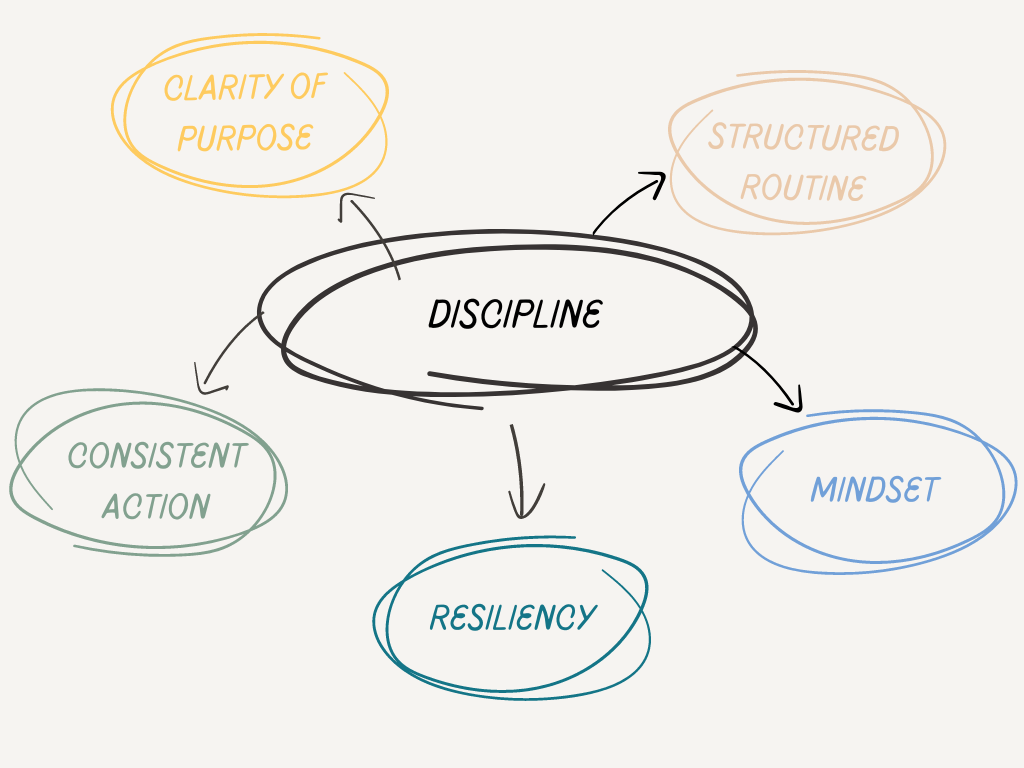The word discipline used to conjure up uncomfortable memories of my childhood, wanting to play outside but my mum yelling at me to come inside and study. My disdain for discipline meant I neglected to have a relationship with it for most of my young adult life. Which resulted in a lot of missed opportunities, ‘I don’t understand why that happened’ statements, to overdrafting my bank account on more than one occasion. Learning the hard way that your relationship with discipline directly impacts your quality of life. Discipline is the cornerstone of achievement, the bridge between intention and manifestation. Yet, for many, the nature of discipline remains a puzzle waiting to be solved. Learn the 5 Pillars of how to create more discipline below.

The First Pillar – Clarity of Purpose
The first pillar of discipline lies in Clarity of Purpose. If you don’t know why you want to be disciplined, it’s hard to clearly see the end result. It’s like setting New Year’s goals and not following through on them. Most of those goals are set vaguely. The problem with vague goals is they aren’t measurable like I want to lose weight vs I want to lose 10kgs. Getting clear on why you want to be disciplined is half the battle.
Unclear purposes include statements like:
- I want to lose weight,
- I want to eat healthier,
- I want more money
They aren’t compelling enough reasons for you to desire more discipline in your life. These statements don’t tell you WHY these things matter.
Clarifying your purpose for more discipline include statements like this:
- I want to age gracefully with minimal disruptions to my health to not become a burden on my family. I can do this by maintaining a healthy weight now to safeguard my future by eating cleanly, losing X number of pounds, or something similar.
- I am responsible for what I ingest both mentally and physically. I take responsibility for my health by eating nutritious foods, minimizing foods that I know cause negative side effects to my body, and reducing my social media and news consumption.
- I do not want to neglect any areas of my health, which includes my financial health. By educating myself and being more conscious of my daily habits such as my spending habits, I teach myself how to be conscious in other areas of my life too.
Take a moment to envision your goals with vivid detail—what do you wish to achieve, and why does it matter to you? By anchoring your actions to a meaningful purpose, you infuse them with purposeful intention, igniting the spark of motivation that propels you forward.
The Second Pillar – Routine, Routine, Routine
The second pillar is Routine, which is the fertilizer that discipline needs to grow and blossom. The power of routine lies in its ability to cultivate consistency and momentum.
I spent most of my childhood negotiating and bartering with my parents to break my routine. Whether it was to push my sleep curfew, watch an extra bit of TV, or sleep in on a weekend morning. I remember offering them a stash of my hidden chocolates in exchange for any one of these. Although I was deflated by my negotiation powers each time they would decline, I understand why they were so hard on me now. The compounding effect of waking up at the same time each morning would be completely thrown out of balance by one late night or morning on a weekend, and the struggle would be much harder the following week to get back into routine.
When I first left home at 18, freedom never tasted so sweet. Dessert was had before dinner, and there was not a vegetable in sight, I’d stay up til 4 am just because I could. You could say my lack of routine had a direct correlation to my lack of good grades at uni and a pretty good explanation of my freshman 20, or in my case freshman 40.

Having a solid routine provides structure and consistency which establishes habitual behaviors that reinforce self-control. It’s hard to achieve more and be disciplined when you don’t have self-control. Over time these become circular – discipline feeds self-control and self-control feeds discipline. Once this cycle begins, it’s easier to consistently be disciplined. But the main thing is, you have to start.
The Third Pillar – Mindset
Your Mindset will determine how you interact with life. The third pillar.
For most of my 20’s I hypnotized myself into believing I wasn’t a disciplined person. It was both my internal and external narrative. My tagline was “I’m the only Asian that lacks discipline”. If you say something long enough, eventually you’ll believe it, and it’ll manifest itself through your actions. Needless to say, I’m a huge believer in self-fulfilling prophecies.
Discipline is not solely about action, arguably it is equally about mindset, where your self-awareness lives. Take a moment to observe your thoughts, beliefs, and patterns of behavior with curiosity, not judgment. Are there self-limiting beliefs that hold you back? When was the last time you put your beliefs to the test? By cultivating a growth mindset of empowerment and possibility, you use your beliefs to fuel your discipline.
Your emotions, beliefs, and thoughts can either energize or deplete you. If you don’t learn how to regulate your mindset, your negative thoughts can drain your internal battery. It’s hard to muster up discipline when you don’t have much in the tank.
The Fourth Pillar – Consistent Action
You cannot have discipline without Consistent Action, the fourth pillar.
We could sit here and debate the intricacies of discipline and how to cultivate it all day, but thankfully we don’t need to. Because it is the simple act of taking consistent, focused action that propels you toward more discipline. Creating more discipline in your life is like building a house. Houses don’t appear overnight. You start small, laying the foundation, taking manageable steps that build upon one another like the framework of the walls to the bricks and drywall. Stacking different ways of incorporating discipline into your life.
Trusting in the process of gradual progress.
How I began to build consistent action was by finding something that I actually enjoyed doing on a daily basis, that was also good for me. For me that was having my cup of tea and reading a book first thing in the morning as part of my morning routine.
Discipline doesn’t have to be tedious, start by building consistent actions towards discipline with things you enjoy first.
The Fifth Pillar – Resilience
The last pillar – Resilience, which is the ability to prepare for, bounce back, and adapt in the face of adversity.
Setbacks will happen, you may fall off your healthy eating plan, text that person that you swore you wouldn’t, or accidentally binge too much TV one weekend. Frustrating as that may be, setbacks are the stepping stones on the path to more discipline. Reframing your setbacks or failures as lessons in disguise (reflection and feedback) will allow you to learn from your mistakes, rather than dwelling on them.
By cultivating your resiliency, you cultivate an unwavering belief in your ability to rise above any challenge that crosses your path.
It is not the absence of obstacles that defines your abilities, but rather your response to them.
Summing Up
We all want discipline for different reasons, we’ve all had different stories we’ve attached to what discipline means for us. In my case, having discipline meant not being free. But it’s from my newfound relationship with discipline that I understand what freedom really is. As with most things, it’s a marathon, not a sprint. Take your time playing with the different pillars and adapt it to suit your circumstances – add, subtract to make it work for you. With Clarity of Purpose, Structured Routine, Empowered Mindset, Resilience in the face of setbacks, and Unwavering Action, you hold the keys to unlocking the potential that lives on the other side of discipline.
